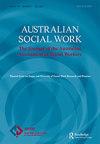Artificial Intelligence and Implications for the Australian Social Work Journal
IF 2
3区 社会学
Q2 SOCIAL WORK
引用次数: 0
Abstract
Social work is a profession committed to integrity and social justice. The AASW Social Work Practice Standards (AASW, 2023) calls on social workers to be critically reflective, ethical practitioners engaged in lifelong professional development and learning. Equally, social work education seeks to prepare students for research-informed, culturally-responsive practice across a diverse range of contexts, and in this Issue, we showcase critical social work education and practice diversity. However, a different ethical challenge to integrity and practice standards is the focus of this Editorial. Here, we highlight some of the concerns and implications of generative Artificial Intelligence (generative AI) for social work education, research, practice, and scholarly publishing. In November 2022, OpenAI released ChatGPT, a generative AI Large Language Model (LLM) that could generate realistic and natural text outputs from simple prompts. This technology had been in development for some time but had not been released to the public for general use. Since then, there has been a proliferation of different AI models that can generate and augment text, images, video, and audio. Generative AI is being used to perform analytical and interpretive tasks such as language translation; responding to queries on specific data sources, coding, and interpreting code; summarising documents and webpages; and creating case assessments and plans. This technology can be used to construct legal documents; machine learning for facial recognition; and for undertaking medical, mental health, and other diagnostic assessments. These are just some examples. In this fast-moving field, the uses and applications seem endless. The open-sourcing of generative AI models and their underlying architecture means developers are starting to create a myriad of practical applications and tools that rapidly increase the depth and scale of automation, potentially replacing or augmenting many everyday tasks normally performed by humans. The implications for social work education, practice, research, and scholarship are extensive. As with any new technology, there are a range of stances, from early adopters to positions that have resonance with luddism. This adds to the complexities of responding to AI as a whole profession. Nevertheless, what is clear is that the rise and integration of generative AI systems, at scale, will yield a wide range of practical, ethical, and epistemological problems for many professions, including social work. It is to some of these problems we turn our attention below. Beginning with social work education, generative AI will have profound effects on assessment and learning for higher education providers. It is likely to cause educators to re-evaluate their educational practices, assessments, and assumptions about what is core to a social work curriculum. Social work will need to refine and reappraise its ideas about critical thinking, ethical decision making, professional judgement, and reflective practice—all skills that are considered core to effective social work practice as outlined in the AASW Practice Standards (AASW, 2023). How will we ensure students have an educational environment that promotes人工智能及其对澳大利亚社会工作杂志的影响
本文章由计算机程序翻译,如有差异,请以英文原文为准。
求助全文
约1分钟内获得全文
求助全文
来源期刊

Australian Social Work
SOCIAL WORK-
CiteScore
4.20
自引率
16.70%
发文量
37
期刊介绍:
Australian Social Work is an international peer-reviewed journal reflecting current thinking and trends in Social Work. The Journal promotes the development of practice, policy and education, and publishes original research, theoretical papers and critical reviews that build on existing knowledge. The Journal also publishes reviews of relevant professional literature, commentary and analysis of social policies and encourages debate in the form of reader commentary on articles. Australian Social Work has grown out of the Australian context and continues to provide a vehicle for Australian and international authors. The Journal invites submission of papers from authors worldwide and all contributors are encouraged to present their work for an international readership.
 求助内容:
求助内容: 应助结果提醒方式:
应助结果提醒方式:


